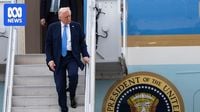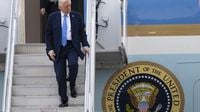WEST PALM BEACH, Fla. (AP) — In a striking declaration, President Donald Trump confirmed on Sunday, March 30, 2025, that he is not joking about his desire to pursue a third term in office, hinting at potential methods to circumvent the constitutional limitations imposed by the 22nd Amendment. This amendment, ratified in 1951, clearly states that no individual can be elected to the presidency more than twice.
During a telephone interview with NBC News from his Mar-a-Lago estate, Trump stated, "There are methods which you could do it," when discussing ways to extend his presidency beyond the two-term limit. He noted that many people have approached him about the possibility of a third term, which he considers akin to a fourth since he maintains that the 2020 election, which he lost to Democrat Joe Biden, was rigged.
Despite his bold claims, Trump's comments have raised eyebrows among legal experts and political analysts. Jeremy Paul, a constitutional law professor at Northeastern University, pointed out that there are no credible legal avenues for Trump to pursue a third term. He emphasized, "If Congressional Republicans believe in the Constitution, they will go on the record opposing Trump’s ambitions for a third term." This sentiment was echoed by Rep. Daniel Goldman, a New York Democrat and lead counsel for Trump’s first impeachment, who described Trump's remarks as an escalation in his efforts to undermine democratic processes.
Trump's contemplation of a third term is not entirely surprising, given his past musings about serving longer than two terms. In January 2025, he quipped during a House Republican retreat, "Am I allowed to run again?" His supporters, including former Trump strategist Steve Bannon, have been vocal about their desire for Trump to run again in 2028, with Bannon stating at the Conservative Political Action Conference last month, "We want Trump in ’28."
While some supporters, like 30-year-old former paralegal Kayla Thompson from Wisconsin, expressed enthusiasm for a Trump return, legal scholars remain skeptical about the feasibility of such a move. Derek Muller, a professor of election law at Notre Dame, affirmed that the 22nd Amendment would prevent Trump from running for vice president under another candidate, such as current Vice President JD Vance, and subsequently assuming the presidency. Muller remarked, "I don’t think there’s any ‘one weird trick’ to getting around presidential term limits."
Moreover, any attempt to amend the Constitution to allow for a third term would face significant hurdles. Republican Congressman Andy Ogles from Tennessee introduced a resolution in January 2025 to amend the Constitution, permitting a president to serve three terms as long as they do not serve two consecutively. However, this proposal lacks widespread support within the party, as evidenced by Republican Senator Markwayne Mullin's refusal to back such changes.
Historically, the precedent for a two-term presidency was set by George Washington in 1796 and adhered to by most presidents until Franklin D. Roosevelt's unprecedented four-term election. Roosevelt's tenure during World War II prompted the ratification of the 22nd Amendment, which aimed to prevent any future president from seeking more than two terms.
Trump's assertion that Americans would support a third term due to his popularity has been met with skepticism. He claimed to have "the highest poll numbers of any Republican for the last 100 years," despite Gallup data showing his approval ratings peaking at 47% during his second term. Comparatively, President George W. Bush achieved a 90% approval rating following the September 11 attacks, while George H.W. Bush reached 89% after the Gulf War.
As Trump continues to navigate the complexities of his political ambitions, the prospect of a third term remains fraught with legal and logistical challenges. Experts suggest that the idea is more about projecting strength than a genuine plan to reclaim the presidency.
As the political landscape evolves, Trump's intentions will undoubtedly be scrutinized by both supporters and opponents alike. His recent comments serve as a reminder of his enduring influence within the Republican Party and the ongoing debates surrounding presidential term limits.
While the prospect of a third term may seem far-fetched to some, Trump's determination to remain a significant player in American politics is clear. Whether he can rally enough support to challenge the constitutional barriers remains to be seen, but his recent statements have certainly reignited discussions about the future of presidential term limits in the United States.






